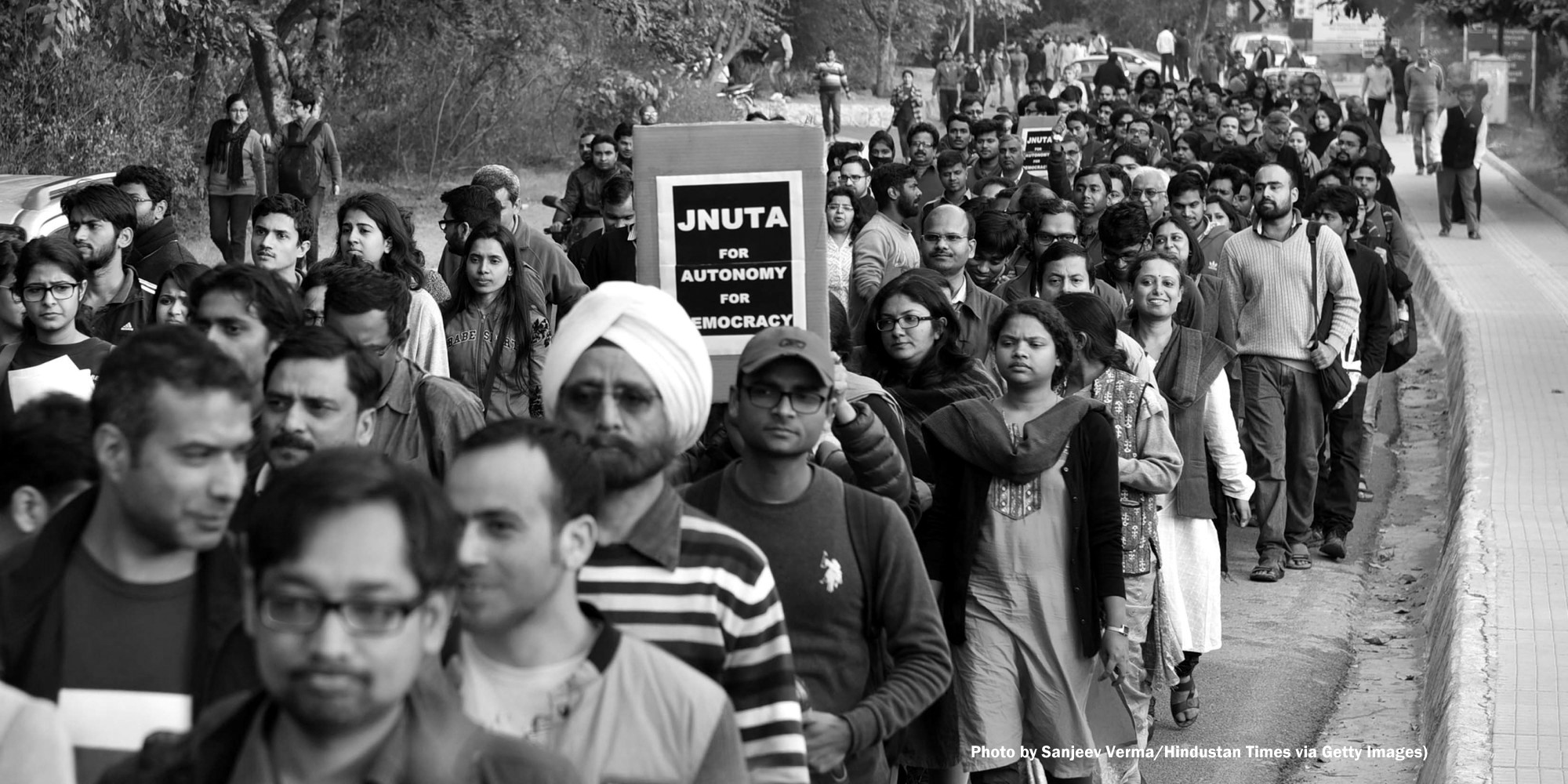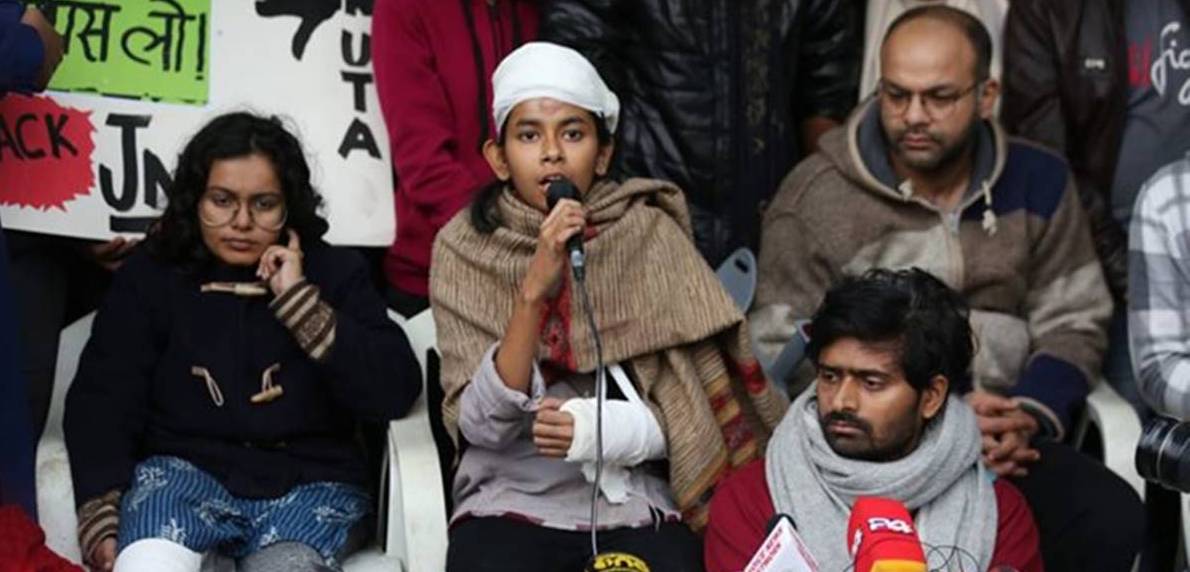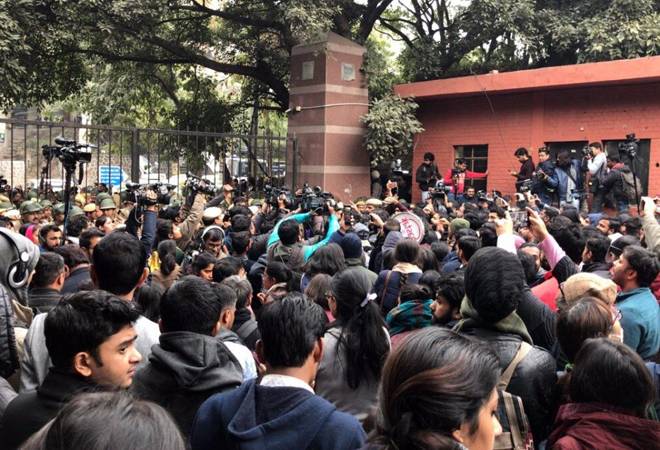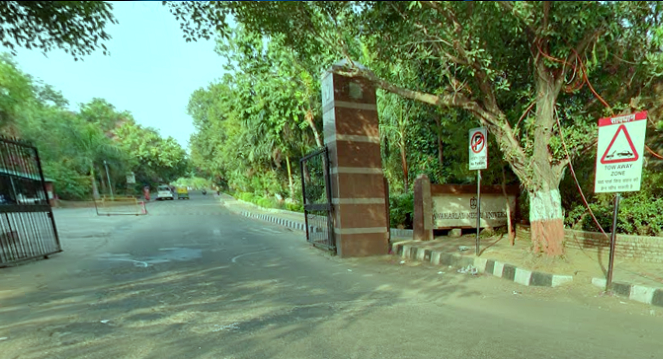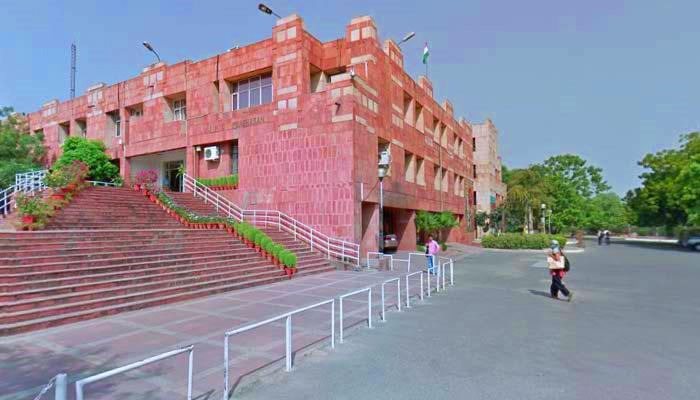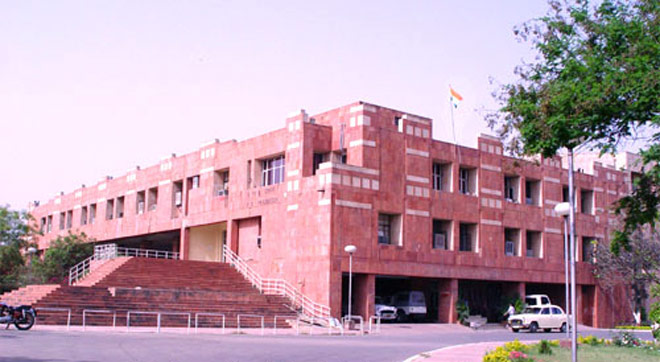JNU: CAN IT REDEFINE ITSELF?
The future of higher education is inextricably connected to the future that we make available to the next generation of young people. Finding our way to a more humane future means educating a new generation of scholars who not only defend higher education as a democratic public sphere, but who also frame their own agency as both scholars and citizen activists willing to connect their research, training, and service with broader democratic concerns over quality and justice, and with an alternative vision of what the university might be and what society might become.
– Henry A. Giroux, On Critical Pedagogy
It is a beautiful winter morning. A new semester begins at JNU—a leading university in the country known for its splendid landscape, vibrant scholarship and cultural diversity. Yet, not everything is fine. Surveillance, suspicion, fear, doubt, anxiety: all negative emotions tend to have enveloped the entire campus—its students and teachers. The continual protest politics by students, the broken communication between the administration and the union, the suspension of select students, the enquiry commission against a distinguished faculty for her dissenting voice, the fear—shared by many—that the university might lose some of its unique features relating to culture, autonomy, liberal education and political vibrancy: everything tends to indicate that a deep crisis haunts the university. The New Leam research team which is seriously concerned with the realm of education in the country has come forward with three suggestions for restoring the spirit of the university.
(I) VICE-CHANCELLOR: YOU ARE NOT THE CEO OF A FACTORY
It is absolutely important for the new administration to understand that a university is not a factory; teachers are not ‘service providers’, and students are not captive consumers, and a vice-chancellor is not the CEO, but essentially a teacher—a co-traveller. It is a place that nurtures human souls—a place that ought to be filled with the spirit of epistemological questions, political philosophies and cultural/philosophical reflections. It is critical pedagogy that should distinguish a university like JNU; its purpose is not just to ‘train’ people for future manpower allocation. It must aim at nurturing minds for the consolidation of a democratic/egalitarian civic life. If you acknowledge this you would realize that intense political debates and diverse ideological articulations are natural for a university. If the management sees it as an ‘aberration’ or a ‘law and order problem’, it would miss the very sprit of what Paulo Freire regarded as ‘dialogic’ learning or ‘problem posing’ education. See the absurdity. The university has decided to set up a high level enquiry committee against an assertive/ politically vibrant professor. It is possible for one to disagree with her worldview—her ideologies of nationalism, patriarchy and gender; but then, a university as a site of what Habermas regarded as communicative interaction must give her the space and dignity to articulate her views and communicate with students. After all, despite her political engagement, she has never compromised with her academic work. How sad it is that the new VC has chosen to withdraw himself into a self-made cage. Let him move around the campus, see it with wonder and joy, look at its beautiful posters, attend some late night hostel meetings. If he breaks the inertia, and dares to fight the pathology and loneliness of power he would realize that a university is not a technical institution; there is a life beyond ‘engineering’ mentality.; and science, as the conversation between Albert Einstein and Rabindranath Tagore suggests, has its aesthetics and poetry. Yes, as a leader, it is his task to see that the university retains its civility and peace because true learning—even radical learning—is not possible if there is violence and mob mentality; and cops and security guards and CCTV cameras can never assure lasting peace because it emanates from inner strength. It is, therefore, important for him and his team to accept the character of this place—its vibrancy, its culture of debate, its language of resistance, its art of pluralism and above all, its academic brilliance. It is a university that demonstrates that education is no just about learning ‘skills’; it is a process of constant reflection on ethics, politics, culture and morality. Why should the VC allow himself to forget that a true teacher doesn’t fear students, or a true teacher, far from cherishing the iron cage of bureaucracy, remains a humble learner?
(II) TEACHERS: YOU CANNOT FORGET YOUR GRACE
The beauty of a university lies in the authenticity of the teacher-taught relationship. Even though JNU is known for its pretty relaxed/informal environment that nurtures a dialogic relationship between the faculty and students, the tragic fact is that things are deteriorating fast. There are three reasons for this. First, it is no longer a small/face-to- face community of learners; the university has become too big. The result is growing anonymity, and it is becoming increasingly difficult to retain the earlier charm of the relationship. Second, in the new era of constant ‘performance’ and ‘productivity’, a teacher is fast becoming a careerist preoccupied with his/her publications, projects and research grants. A creative/sustained engagement with students, for many teachers, is no longer the first priority. And third, a major change has taken place in the composition and worldview of students. On the one hand, many new generation students are the children of post-liberalization India; market rationality, consumerism, instrumental approach to life tend to negate love, passion, reverence and warmth form their lives. Consume JNU, see it as a ‘brand’, get a degree, and then forget it—when you come to a university with such thinking, you do not relate, you do not engage with any teacher: deeply, intensely and meaningfully. A teacher, for you, is just a course instructor, or someone who can write recommendation letters for your doctoral fellowship abroad. Is it surprising that acute loneliness, mental depression and alcoholism characterize JNU hostels? See the anonymity. A student dies; and only after three days the dead body is found from the hostel . On the other, in post-Mandal India, you see yet another assertion relating to caste identity, reservation and social justice. At times, this politics, because of the long history of social stratification and exclusion, takes a bitter/negative/cynical turn. You begin to suspect your teachers, their integrity; you essentialize your teachers in the name of caste. You popularize the conspiracy theory. It is a trap. One never comes out of the burden of ‘victimhood’. Ironically, in the recent times some JNU teachers, instead of playing a constructive role, have further stimulated this culture of doubt. Today in this university teachers are classified and certified on the basis of their ‘political correctness’: ‘Ambedakarite’ teachers; ‘Marxist’ teachers, ‘feminist’ teachers; and if you do not fall into any of these types you are bound to be dull, socially conservative, politically naïve, and possibly ‘rightist’! This group politics has its own business. Even your ‘dissent’, your ‘left-Ambedkarism’, your package of Savitri Phule, Bhagat Singh and Birsa Munda can sell in the academic market; international publishing houses, foreign universities, heavily funded NGOs are there to take care of you. In a way, there is something fundamentally wrong in the teacher-taught relationship. But its beauty and grace has to be restored. It is possible only when we become humble, learn from one another, develop basic trust, and cultivate the art of listening. That is the spirit of a truly liberal university. But if it is hijacked by a group of ‘radical’ teachers and students who refuse to see anything beyond ‘Marxism-Ambedkarism-Feminism’ trinity, it would cause a great damage to the spirit of dialogue. I may be a Marxist. But if I am a learner, how is it possible for me not to listen to Karl Popper? I may be an Ambedkarite; but why should it prevent me from studying Gandhi without uttering a nasty slogan? Or I may be a feminist; but it should not prevent me from inviting scholars who have a different story to tell. I may be an atheist; but I can always say that an engagement with Adi Sankara’s non-dualism is truly thrilling. JNU needs contemplation, trust, empathy, dialogue, patience, understanding and a bit of humility. It has become too noisy.
(III) STUDENTS: YOUR RESISTANCE CANNOT BE OBSESSIVE COMPULSION
True, as JNU has proved time and again, studentship is not inseparable from political practice. In fact, it is the constant reflection on the way power is exercised, distributed and disseminated in society that gives a new meaning to the pursuit of knowledge. In fact, liberal arts, humanities and social sciences—the major component of JNU knowledge traditions—stimulate political thinking and practice, and make a careful learner see the world through the vantage point of caste and gender, class and race, identity and marginalization. Not surprisingly, politics has fascinated JNU students. And there is nothing wrong in it. However, over the years, the quality of politics has undergone a dramatic transformation. There are two things that have happened. First, competitive radicalism has altered the meaning of protest; it is now a form of obsessive compulsion; hunger strike is normal and routinized; effigy burning is fun; Jay Bhim is a slogan that can be uttered anywhere anytime; the frequency with which one sees the legacy of ‘patriarchal brahminism’ in Gandhi, Tagore, Nehru and of course, Hindu rightists is amazing—almost like a magician’s play. This changing politics with rhetoric, abuses and at times, even aggressive postures is different from what used to characterize this place—its refined culture of debate and its civility. Not solely that. In the changed political arena, Marx and Ambedkar are engaged in a terribly complex relationship. Whereas the Marxists, because of their insecurity and identity confusion, seek to include Ambedkar in their politico-cognitive map, the Ambedkarites remain skeptical about it because they still feel that the Marxists are a ‘bunch of Brahmins’. Who would possess Ambedkar? A significant of amount of time and energy is spent in this futile exercise. It is sad. If JNU cannot provide a model of sane politics, it fails as a liberating university. And if JNU collapses, Indian higher education will experience a severe blow. It is time the JNU community rethinks its political culture and its academic/social/ethical responsibility.
The New Leam has no external source of funding. For retaining its uniqueness, its high quality, its distinctive philosophy we wish to reduce the degree of dependence on corporate funding. We believe that if individuals like you come forward and SUPPORT THIS ENDEAVOR can make the magazine self-reliant in a very innovative way.

